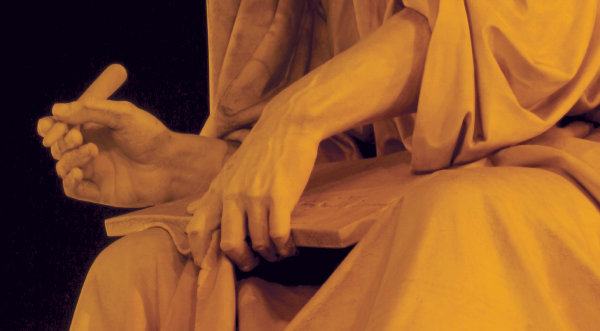
Author
Because the prophet Zephaniah was the “son of Cushi” (1:1) and uniquely interested in the sin and future restoration of the Cushites (i.e., black Africans from ancient Ethiopia, today modern Sudan, 2:12; 3:9–10), he may have been a black Jew. Books like Genesis, Deuteronomy, Amos, and Isaiah apparently influenced him, and he may have been aware of the ministries of his contemporaries Nahum, Habakkuk, and young Jeremiah.
Zephaniah means “Yahweh hides.” Perhaps his parents prayed that God would protect him at his birth during the shadowy reign of Manasseh (2 Kgs 20:21—21:18), who was son of King Hezekiah (2 Kgs 18–20; Isa 36–38), Zephaniah’s great-great-grandfather (Zeph 1:1). As part of the royal family, Zephaniah was part of the Messianic-Davidic hope that still burned in the darkness. His social status may explain how he was aware of the international climate (2:5–15) and the ethics of Jerusalem’s political and religious leadership (1:4, 8–9; 3:3–4).
Date
Zephaniah prophesied during the reign of King Josiah of Judah (641/40–609 BC) (1:1). In about 628 BC, Josiah started removing all pagan Canaanite shrines and emblems (2 Chr 34:3–7), and around 622 BC he recovered the Book of the Law and instituted a mass religious reform throughout the land (2 Kgs 22:3—23:25; 2 Chr 34:8—35:19). Because Zephaniah’s message shows signs of Deuteronomy’s influence while stressing a high need for spiritual growth, he likely ministered early in 622 BC after Josiah found the Book of the Law but before the reform movement was fully underway.
Message
Zephaniah provides a summons to satisfaction—a call to persevering trust in God in order to experience personal and divine pleasure in the future. In light of the impending day of Yahweh’s wrath, the prophet urges his listeners to join the remnant in patiently pursuing Yahweh (i.e., “seek” [2:3] and “wait” [3:8]); this alone will preserve them through judgment and secure consummate joy in God (3:14) and the experience of God’s delight in saved sinners (3:17). Three main messages are evident.
Basic Training for Satisfaction
Because Yahweh’s day of fury is coming, Judah must repent and wait upon God. The prophet calls the people back to the basics as the only means for experiencing salvation through judgment (2:1, 3; 3:8). Two judgments are certain: (1) near judgment against Judah through Babylon (1:4–13; 2:2; 3:7), and (2) future judgment against the entire world due to pervasive sin against the God of all the earth (1:1–3, 14–18; 3:8; cf. Deut 30:7; Isa 24:5–6).
These warnings provide the context for the book’s main purpose: to exhort Judah to trust God to faithfully preserve and ultimately satisfy them—even through judgment. What we hope for or fear tomorrow changes who we are today. Zephaniah motivates his audience with hope and dread as basic training for finding satisfaction in the Lord (2:1, 3; 3:8, 14–15).
Yahweh’s War Equated With Sacrifice
The fires of Yahweh’s retributive war will destroy the entire old creation order, including unbelieving humanity (1:3, 18; 3:8), yet Yahweh will protect those who have humbled themselves and called on his name (2:3; 3:9, 11). How can a righteous God who does no injustice (3:5) pardon, preserve, and bring pleasure to former sinful rebels (3:9–20)?
Zephaniah says little explicitly about the saving work of the Messiah, probably to portray that the Judahites were deep in darkness and almost fully separated from hope. But he hints that the means for understanding salvation through judgment and the inauguration of new creation is penal substitutionary atonement. He associates the fires of God’s judgment with sacrifice (1:7; cf. 1:18; 3:8), which appeases God’s righteous wrath. He also urges his audience to “draw near” to Yahweh (3:2), the exact language for approaching God by faith through a substitute sacrifice (Lev 9:1—10:3), which points to Christ (Heb 9:11–14, 27–28; 10:11–14). Jesus took upon himself the sacrificial fires of God’s judgment on behalf of all who believe (1:7, 18; 3:8; cf. Isa 53:5, 7, 11); thus God is both just and the justifier (Rom 3:24–26). See “Sacrifice”, and “Wrath.”
Global Salvation
While Zephaniah focuses on a righteous remnant from Judah, he also highlights that God will save other peoples of the world (3:9–10; cf. 2:11). He thus anticipates the church age and the fulfillment of the Abrahamic covenant in blessing Jews and Gentiles alike in Christ (Gal 3:8, 14, 29; Eph 2:14–16). Together they will worship the King, the “Mighty Warrior who saves” (3:17; cf. 3:14–15). All these features have been inaugurated already in Christ and his church, and they now await complete consummation at Christ’s second coming. See “People of God.”
Outline
I. Superscription (1:1)
II. Judgment on the Whole Earth in the Day of the Lord: A Call to Dreadful Silence Before God (1:2–18)
A. The Reason for the Call to Silence (1:2–6)
B. The Nature of the Call to Silence (1:7–18)
III. Judah and Jerusalem Judged Along With the Nations: Calls to Repent and to Wait for God (2:1—3:8)
A. Judah Summoned to Repent Before the Lord to Avoid Judgment (2:1–3)
B. Reasons for the Summons to Repent and Wait (2:4—3:7)
1. The Lamentable State and Fate of the Rebels From the Foreign Nations (2:4–15)
2. The Lamentable State and Fate of the Rebels From Jerusalem (3:1–7)
C. Judah Summoned to Wait for the Lord, Ultimately to Enjoy Satisfaction (3:8)
IV. Restoration of Israel’s Remnant: Lasting Joy as Motivation for Waiting on God (3:9–20)
A. The Motivation: Global Salvation (3:9–10)
B. The Impact of Global Salvation for the Remnant of Judah: Lasting Joy (3:11–20)
![]()
![]()
